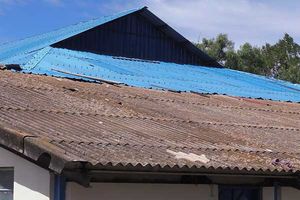
Cyrus Jirongo during an interview at his Mayfair Suites offices in Nairobi on October 28, 2021.
Politician Cyrus Jirongo and other senior government officials who served during the Moi regime are wanted by a parliamentary committee to provide evidence regarding the dumping of toxic nuclear waste in the northeastern region.
The National Assembly Committee on Environment, Forests and Mining has summoned Mr Jirongo to appear before it after he recently claimed to know the individuals responsible for the dumping of toxic chemicals, which have been associated with high rates of cancer in the region.
On Tuesday, the committee, chaired by Mwala MP Vincent Musyoka, began its investigation into the dumping of toxic chemicals in the 1990s with a meeting with the area MP, Mohamed Adow, and Garissa Governor Nathif Jama.
Last year, in his Savage Politics podcast, Mr Jirongo alleged that the Moi regime had disposed of toxic chemicals in the north-east.
“We are going to call Mr Jirongo and everyone else who in one way or the other was aware of this matter but decided to keep quiet,” Mr Musyoka said.
“This is not just about health. It’s a security matter, by now it should have attracted the interest of the military,” Mr Musyoka added.
Baringo South MP Charles Kamuren who is the vice chairperson of the committee described Mr Jirongo as a bold person who will help the committee to know who authorised the dumping of the toxic waste in the region.
“I want to thank Mr Jirongo for being bold and coming out to confront the regime then. We must appreciate him (Jirongo) for confronting the former President about the dumping of these toxic chemicals,” Mr Kamuren said.
“We want to know from Jirongo who was behind this. Which companies were involved? Which country did the chemical come from and who benefited from the dumping of the toxic chemicals? We might be suffering here as a country yet someone somewhere is enjoying life,” he added.
The committee is probing the matter courtesy of a petition filed in the House last year by Mr Adow.
In his petition, Mr Adow wants parliament to undertake an inquiry into the alleged illegal dumping of hazardous nuclear waste in the Northern Eastern part of the country, including its environmental effects and the association of high cases of cancer that have been recorded in the region.
The area MP also wants the government to State the measures that the ministry has put in place to ensure that the residents of the region whose land was illegally used for dumping the toxic waste and whose health has now been adversely affected by the harmful chemical are fully compensated.
In addition, the committee will also look at the regulatory framework that the government has put in place to ensure that all hazardous wastes including nuclear waste in the country are securely disposed of without causing harm to human beings, animals and the environment.
Data presented before the committee from Garissa Regional Cancer Centre indicates cancer cases have been on the rise in the region with 2,427 cases so far recorded.

Garissa Governor Nathif Jama addressing journalists after touring the county cancer centre.
This year alone up to June, 647 cases have so far been recorded.
Governor Jama says the cases are mostly oesophageal cancer due to the consumption of toxic water that the area residents consume.
Mr Adow, however, says the number could be higher since the 2,427 are the only people who have come out to seek treatment.
“Others are suffering in the rural areas while others have gone for treatment in India. So the number is bigger than what is reported,” Mr Adow said.
Governor Jama said the toxic chemicals have led to the contamination of soil and water sources which has in turn led to the degradation of the local ecosystem, affecting agriculture and livestock, which are the mainstay of the county's economy.
“Additionally, there have been reports of increased incidences of cancer and other diseases among the residents, which are believed to be linked to exposure to hazardous waste,” Mr Jama said.
“The presence of toxic substances, potentially including nuclear waste, raises serious concerns about chronic health conditions including high cases of cancer in the population exposed to these contaminants,” he added.
Article 42 (a) of the Constitution of Kenya states that “every person has a right to a clean and healthy environment, which includes the right to have the environment protected for the benefit of present and future generations,”
Section 3(1) of the Environmental Management and Coordination Act states that every person in Kenya is entitled to a clean and healthy environment.
Article 69 of the Constitution imposes an obligation on the Government of Kenya to protect and conserve the Environment.






